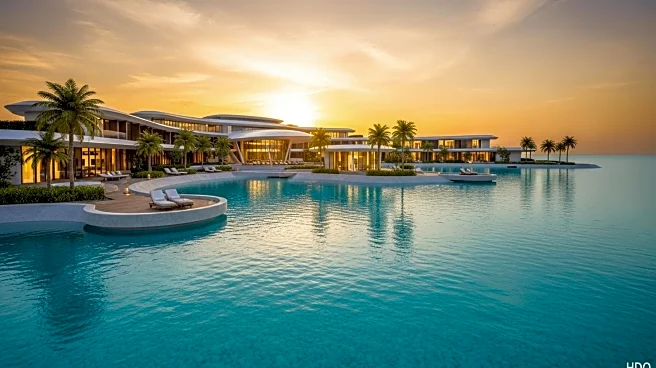What's Happening?
Recent satellite imagery has revealed the emergence of a man-made island off the coast of the Persian Gulf, set to become a luxury destination in the Middle East. The Al Marjan Islands in Ras Al Khaimah, United Arab Emirates (UAE), are attracting world-leading hotels and restaurants. This development is part of a broader strategy by Gulf nations to diversify their economies, which have been impacted by declining oil revenues, through foreign investment and tourism. The island spans approximately 2.7 million square meters and consists of four distinct islands, offering family hotels, beachside resorts, and luxury residences. Notable projects include the Wynn Al Marjan Island, a $5.1 billion integrated resort featuring a 70-story hotel tower, 22 restaurants and clubs, and a full-service marina, slated to open in 2027.
Why It's Important?
The development of Al Marjan Islands is significant as it represents the UAE's efforts to diversify its economy away from oil dependency. By investing in tourism and hospitality, the UAE aims to attract international tourists and global investors, enhancing its economic stability and growth. The project also advances political and soft-power goals, with ties to President Trump and The Trump Organization raising scrutiny in the U.S. The involvement of renowned chefs and luxury brands underscores the UAE's ambition to position itself as a premier global destination, potentially increasing its influence in international tourism markets.
What's Next?
The Al Marjan Islands are preparing for major expansion, with new residential, hospitality, and infrastructure developments set to launch before the end of 2025. Ras Al Khaimah aims to attract more than 3.5 million tourists by 2030, according to Marjan CEO Abdulla Al Abdouli. This expansion is expected to further boost the UAE's tourism sector and attract significant foreign investment, contributing to the country's long-term economic diversification goals.
Beyond the Headlines
The development of Al Marjan Islands highlights the UAE's strategic use of tourism as a tool for economic diversification and soft power. The project may influence regional tourism trends, encouraging other Gulf nations to pursue similar initiatives. Additionally, the involvement of international brands and chefs could lead to cultural exchanges and collaborations, enriching the UAE's culinary and hospitality landscape.












